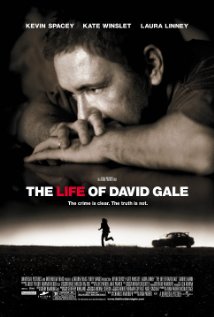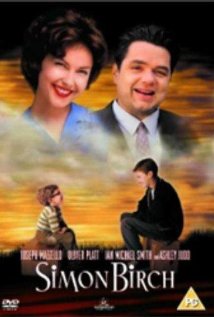Tags
catechesis, Catholic, cinema, Conversion, death, death penalty, Drama, faith, God, Human Dignity, Kate Winslet, Kevin Spacey, Laura Linney, Martyr, movie ministry, pro-life, prolife, reconciliation, Sacrifice, The Life of David Gale
 David Gale to Bitsey Bloom: We spend our whole life trying to stop death. Eating, inventing, loving, praying, fighting, killing. But what do we really know about death? Just that nobody comes back. Then there comes a point – a moment – in life when your mind out lives its desires, its obsessions, when your habits survive your dreams, and when your losses… Maybe death is a gift. You wonder. All I can tell you is that by this time tomorrow I’ll be dead. I know when. I just cannot say why. You have 24 hours to find out.
David Gale to Bitsey Bloom: We spend our whole life trying to stop death. Eating, inventing, loving, praying, fighting, killing. But what do we really know about death? Just that nobody comes back. Then there comes a point – a moment – in life when your mind out lives its desires, its obsessions, when your habits survive your dreams, and when your losses… Maybe death is a gift. You wonder. All I can tell you is that by this time tomorrow I’ll be dead. I know when. I just cannot say why. You have 24 hours to find out.
How many innocent men and women end up being put to death in our justice system? In a day and age of DNA testing and a multitude of forensic analysis methods… it seems just about impossible that it could happen.
In The Life of David Gale, reporter Bitsey Bloom (Kate Winslet) is called in to interview a man, David Gale (Kevin Spacey), who is about to be executed for rape and murder of his friend Constance Harraway (Laura Linney) in Texas. Gale spent his life working with an anti-death penalty group “Death Watch” until he was accused of raping a student and was asked to step back to prevent his sullied reputation from tainting that of the group.
As Gale tells Bitsey the story, she begins to question her own convictions about Gale’s guilt. In fact, she begins to dig deeper trying to find proof of his innocence to prevent his untimely death. Ultimately, The Life of David Gale shows us that there is a definite possibility that in the rush to find out who committed a crime, innocent people are being sent to prison, and especially to death row.
This film is nearly impossible to talk about without really spoiling things for the viewer. So, I won’t delve into the movie itself too much, just pose some questions to think about as you watch:
How do you really feel about the death penalty? It seems that most Catholics (and I might say even Christians) are pro-life when it comes to abortion, and for many even contraception. However, when it comes to the death penalty, many are on the fence, feeling that the convicts deserve death – especially with the thoughts that it is cheaper to kill them than to let them serve life in prison. So, take a minute and think about your true feelings about the death penalty.
Does the death penalty prevent prisoners the chance to find God and repent?
Does killing a killer really prevent more death?
What does the Bible say? There are many references to punishments of death for various crimes in the old testament, but Jesus’s teachings definitely take a softer approach to the old law.
What does the Catechism say? CCC #2267 Assuming that the guilty party’s identity and responsibility have been fully determined, the traditional teaching of the Church does not exclude recourse to the death penalty, if this is the only possible way of effectively defending human lives against the unjust aggressor. If, however, non-lethal means are sufficient to defend and protect people’s safety from the aggressor, authority will limit itself to such means, as these are more in keeping with the concrete conditions of the common good and more in conformity to the dignity of the human person. Today, in fact, as a consequence of the possibilities which the state has for effectively preventing crime, by rendering one who has committed an offense incapable of doing harm – without definitely taking away from him the possibility of redeeming himself – the cases in which the execution of the offender is an absolute necessity “are very rare, if not practically nonexistent.”The filmmaker tried to stay neutral although he has definite anti-death penalty views. Did this film seem neutral to you?
Did this film affect your views on the death penalty?
Does your state allow the death penalty? How often is it carried out? According to the filmmakers, California actually has more inmate on death row than Texas, but Texas kills more inmates per year. Does that surprise you?
“An almost martyr doesn’t count” In a debate with the Texas Governor, Gale is stumped when the Governor offers to abolish the death penalty if Gale can name one innocent person that was put to death. And, every person whose execution is staid due to new evidence shows that the system can work. So the quote arises, “An almost martyr doesn’t count.” When Bitsey really starts to put things together and see that Gale may not really be who he’s been portrayed, she tells him that he should have contact her sooner, that she needs more time. Gale replies, “You’re not here to save me. You’re here to save my son’s memory of his father.” Could you sacrifice yourself for your ideals? Do you see Gale as a martyr for the cause? What about Constance?
Ratings and wrap up: The Life of David Gale is rated “R” for good reason. Graphic nudity, sex and language get it there without any question. The partying, Gale’s drinking problem, the idea that more lovers is a good thing and the dirty limericks don’t help. It is not for the faint hearted. It is not one I’d be likely to show in a group setting, but in my opinion, even though it is hard to watch, it will make it more understandable that it is possible for an innocent person to die for a crime they did not commit.










